Abstract
OBJECTIVE--To establish the prevalence of counselling services in English and Welsh general practices and factors associated with their distribution; to describe qualifications, working arrangements, and case mix of "counsellors." DESIGN--Postal questionnaire and telephone interview survey of a sample of about one in 20 general practitioners in England and Wales. SETTING--English and Welsh general practices. SUBJECTS--1880 general practitioners of whom 1542 (82%) completed questionnaires. MAIN OUTCOME MEASURES--Prevalence and distribution of practice counselling services; counsellors' qualifications and funding; types of patients referred. RESULTS--586 counsellors were distributed among 484 of the 1542 practices. Three types of counsellor predominated: community psychiatric nurses (187); "practice counsellors" (145); and clinical psychologists (95). Practice characteristics which independently predicted the presence of a counsellor were for community psychiatric nurses four or more partners (odds = 1.72, 95% confidence interval 1.18 to 2.26); for practice counsellors stress clinic (odds = 2.22; 1.83 to 2.61), training practice (odds = 1.70; 1.24 to 2.16), and health region (chi 2 = 55.94; df = 14; p < 0.001); and for clinical psychologists list size of > or = 10,500 (odds = 1.79; 1.09 to 2.49), training practice (odds = 1.78; 1.31 to 2.25), health region (chi 2 = 48.31; df = 14; p < 0.001). 197 counsellors had training in counselling. The qualifications of 85 were unknown to the general practitioner. The principal source of funding was the district health authority for community psychiatric nurses (150) and clinical psychologists (58) and the family health services authority for practice counsellors (76). All counsellors were referred a wide range of problems. CONCLUSIONS--Counselling services are wide-spread in general practice, but a high proportion of counsellors lack qualifications, and many may be referred problems outside their knowledge.
Full text
PDF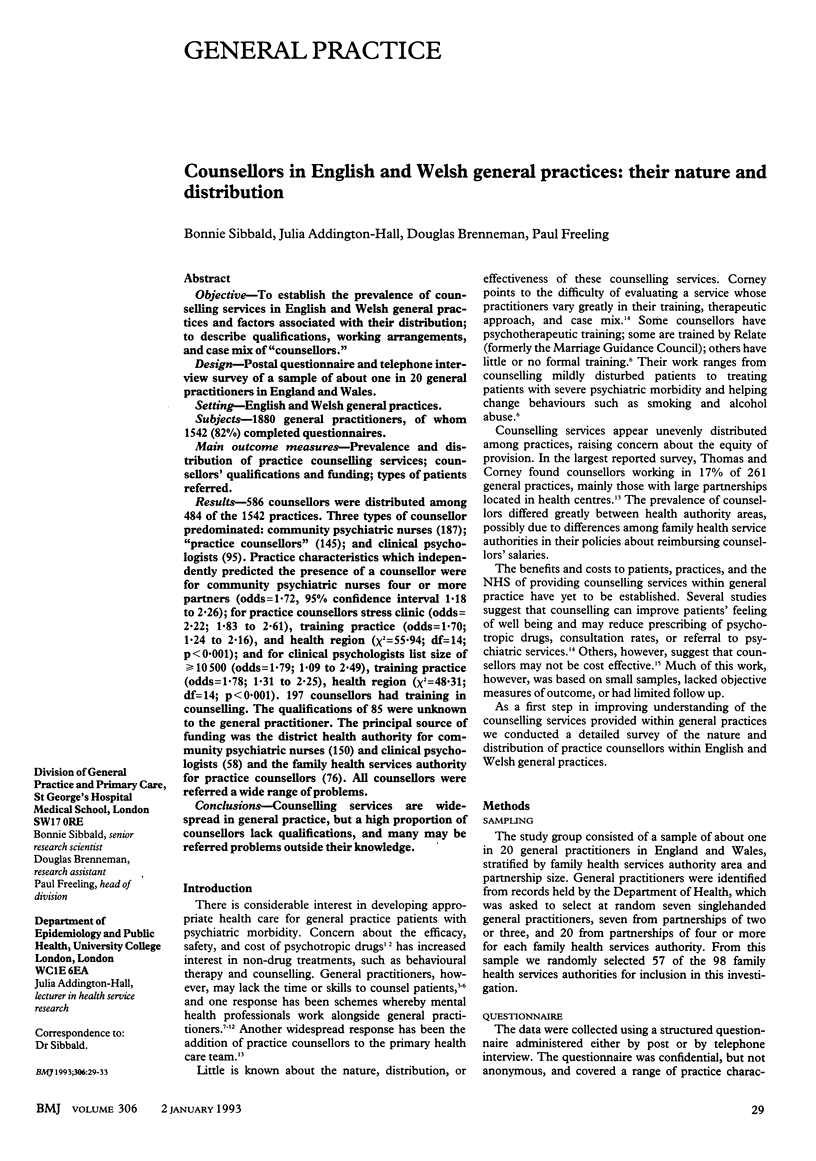
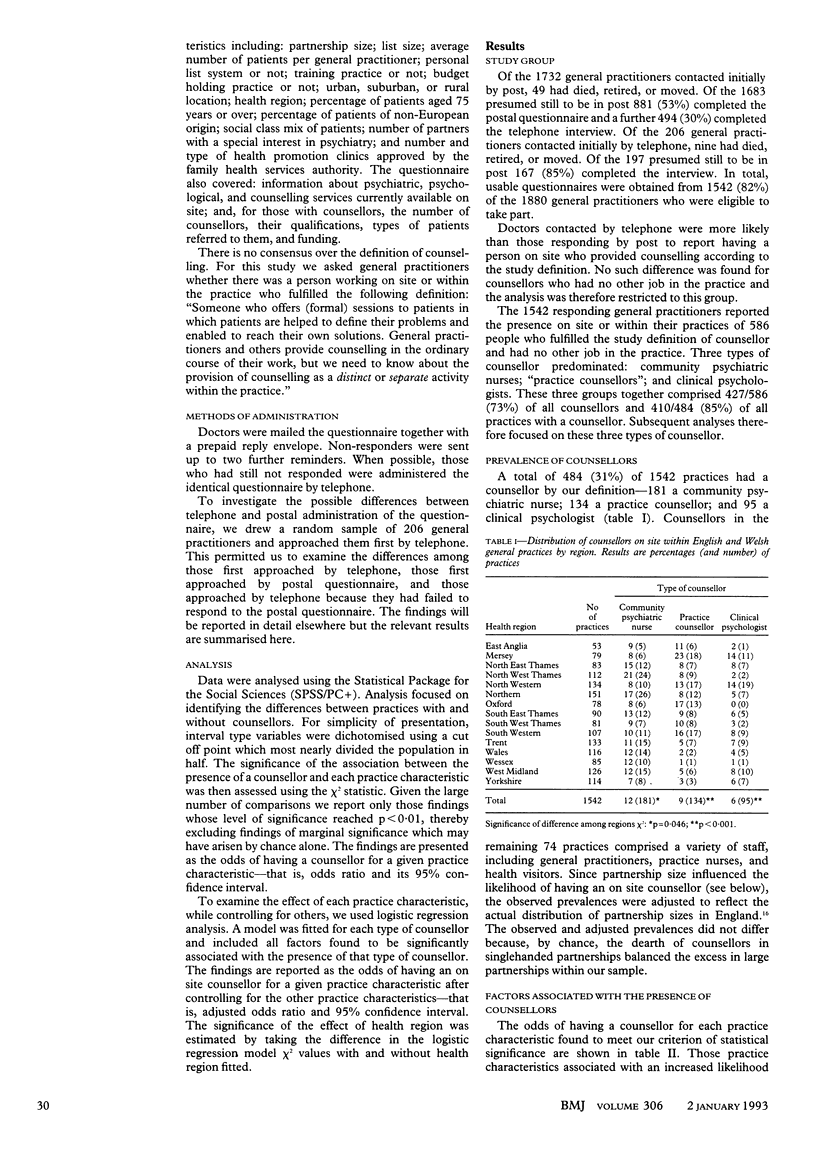
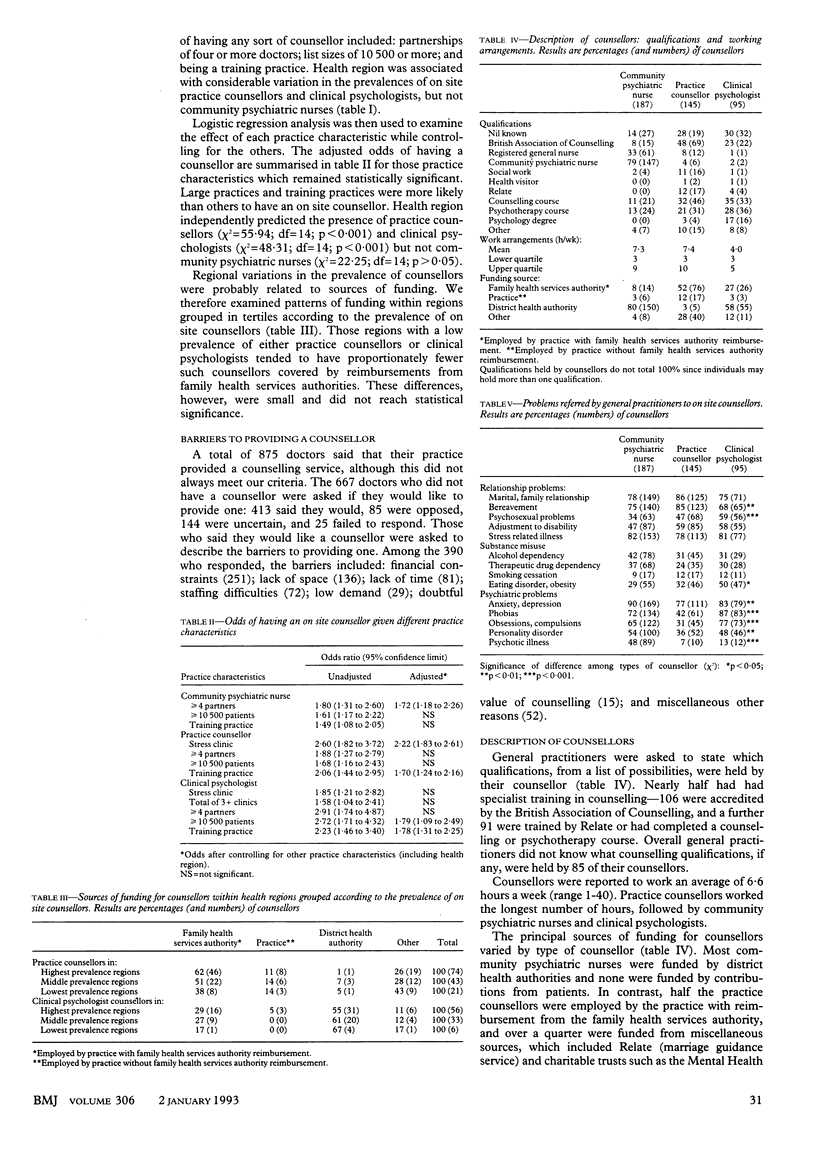
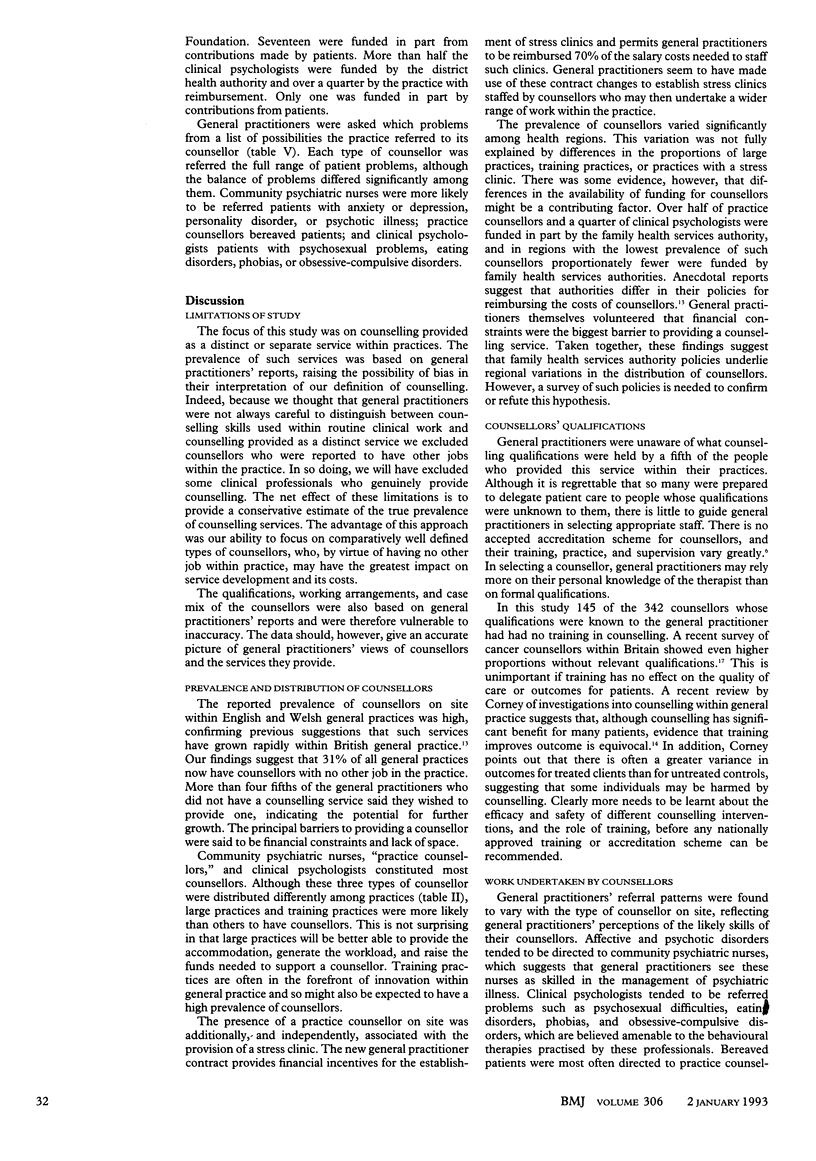
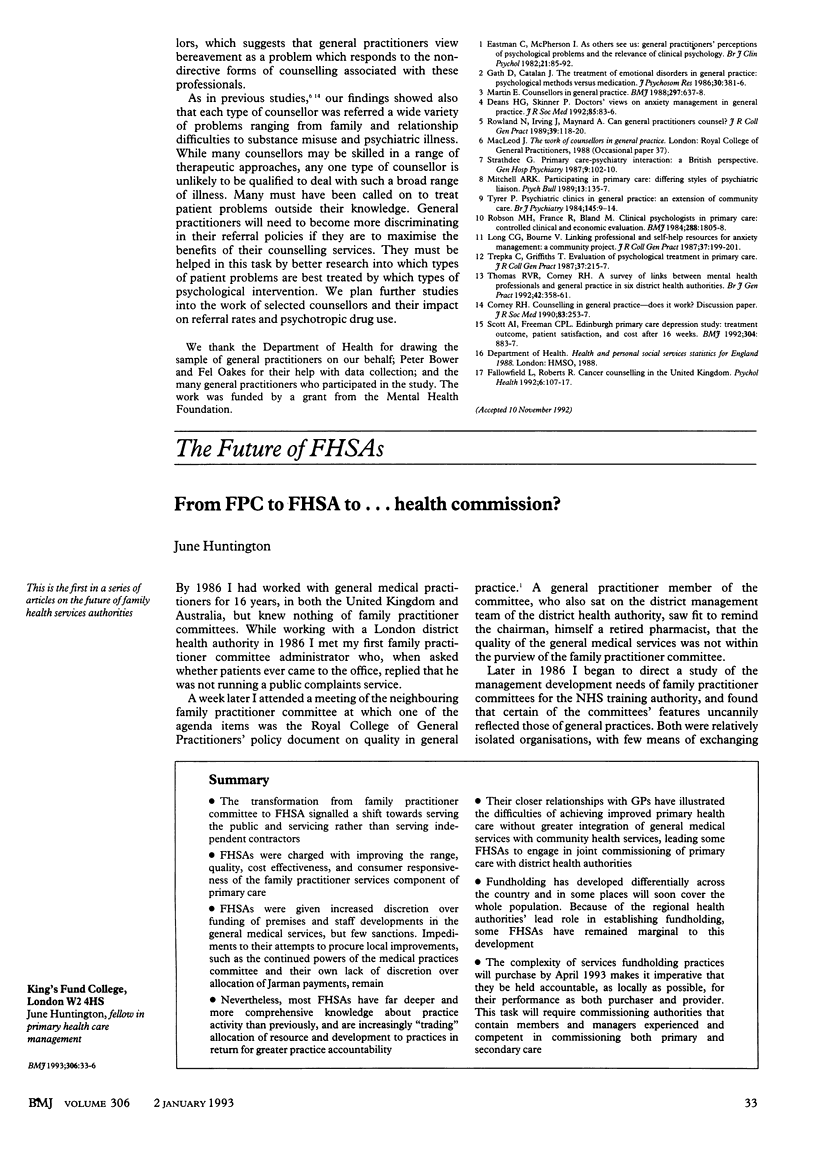
Selected References
These references are in PubMed. This may not be the complete list of references from this article.
- Corney R. H. Counselling in general practice--does it work? Discussion paper. J R Soc Med. 1990 Apr;83(4):253–257. doi: 10.1177/014107689008300416. [DOI] [PMC free article] [PubMed] [Google Scholar]
- Deans H. G., Skinner P. Doctors' views on anxiety management in general practice. J R Soc Med. 1992 Feb;85(2):83–86. doi: 10.1177/014107689208500210. [DOI] [PMC free article] [PubMed] [Google Scholar]
- Eastman C., McPherson I. As others see us: general practitioners' perceptions of psychological problems and the relevance of clinical psychology. Br J Clin Psychol. 1982 Jun;21(Pt 2):85–92. doi: 10.1111/j.2044-8260.1982.tb00536.x. [DOI] [PubMed] [Google Scholar]
- Gath D., Catalan J. The treatment of emotional disorders in general practice: psychological methods versus medication. J Psychosom Res. 1986;30(3):381–386. doi: 10.1016/0022-3999(86)90017-6. [DOI] [PubMed] [Google Scholar]
- Long C. G., Bourne V. Linking professional and self-help resources for anxiety management: a community project. J R Coll Gen Pract. 1987 May;37(298):199–201. [PMC free article] [PubMed] [Google Scholar]
- Martin E. Counsellors in general practice. BMJ. 1988 Sep 10;297(6649):637–638. doi: 10.1136/bmj.297.6649.637. [DOI] [PMC free article] [PubMed] [Google Scholar]
- Robson M. H., France R., Bland M. Clinical psychologist in primary care: controlled clinical and economic evaluation. Br Med J (Clin Res Ed) 1984 Jun 16;288(6433):1805–1808. doi: 10.1136/bmj.288.6433.1805. [DOI] [PMC free article] [PubMed] [Google Scholar]
- Rowland N., Irving J., Maynard A. Can general practitioners counsel? J R Coll Gen Pract. 1989 Mar;39(320):118–120. [PMC free article] [PubMed] [Google Scholar]
- Scott A. I., Freeman C. P. Edinburgh primary care depression study: treatment outcome, patient satisfaction, and cost after 16 weeks. BMJ. 1992 Apr 4;304(6831):883–887. doi: 10.1136/bmj.304.6831.883. [DOI] [PMC free article] [PubMed] [Google Scholar]
- Strathdee G. Primary care-psychiatry interaction: a British perspective. Gen Hosp Psychiatry. 1987 Mar;9(2):102–110. doi: 10.1016/0163-8343(87)90021-1. [DOI] [PubMed] [Google Scholar]
- Thomas R. V., Corney R. H. A survey of links between mental health professionals and general practice in six district health authorities. Br J Gen Pract. 1992 Sep;42(362):358–361. [PMC free article] [PubMed] [Google Scholar]
- Trepka C., Griffiths T. Evaluation of psychological treatment in primary care. J R Coll Gen Pract. 1987 May;37(298):215–217. [PMC free article] [PubMed] [Google Scholar]
- Tyrer P. Psychiatric clinics in general practice. An extension of community care. Br J Psychiatry. 1984 Jul;145:9–14. doi: 10.1192/bjp.145.1.9. [DOI] [PubMed] [Google Scholar]


